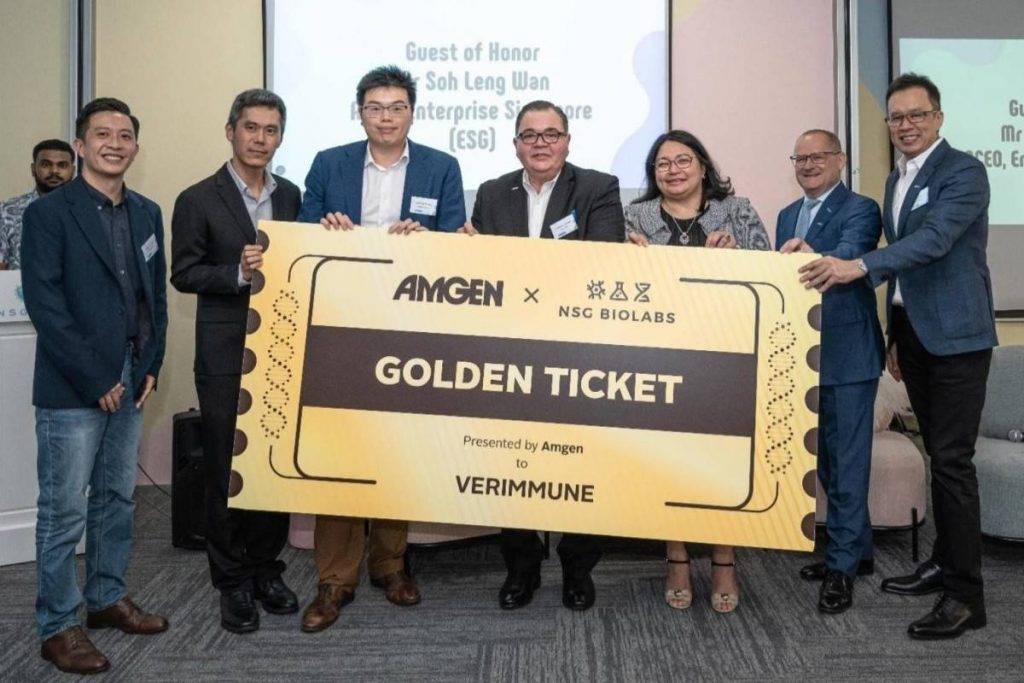In a significant move to bolster the local biotech industry, global biotech leader Amgen and NSG BioLabs, Singapore’s premier provider of biotech co-working laboratories, have announced VerImmune as the latest winner of their prestigious Golden Ticket Programme.
This announcement underscores their commitment to fostering innovation and collaboration in Singapore’s burgeoning biotech sector.
VerImmune Earns Golden Ticket with ViP Technology
VerImmune emerged victorious, thanks to its innovative Virus-inspired Particle (ViP) technology. This ground-breaking platform holds immense potential for treating various diseases. Their novel approach to cancer immunotherapy, known as Anti-tumor Immune Redirection (AIR), leverages immune memory from past infections or childhood vaccination to fight cancer.
The win offers VerImmune the chance to further explore this technology’s potential to meet other areas of unmet medical needs. VerImmune was selected from a virtual pitch event where five finalists presented their business plans to a panel of Amgen’s internal scientific leaders. The panel evaluated each pitch based on scientific rationale, subject matter expertise, and business plan viability.
As the winner, VerImmune receives a one-year free residency in NSG BioLabs’ state-of-the-art BSL-2 laboratory. Additionally, They will also benefit from access to Amgen’s extensive network of scientific and business leaders.
Amgen’s Vice President, Dr. Alan Russell, highlighted the importance of nurturing young companies and their ideas, stating, “We are excited to collaborate and engage with VerImmune to harness the potential of their technology and advance novel biotherapeutics.”
How VerImmune Works
Joshua Wang, Founder and Chief Executive Officer of VerImmune) explains how their product works. He stated, “VerImmune’s approach redirects and repurposes the very same T-cell immune memory that protects against various viral e.g cytomegalovirus, herpes or childhood diseases like the flu or chickenpox to target cancer. The approach basically utilizes the ViPs to target tumour cells and make them look like they are virally infected. This tricks your body’s immune system into seeing cancer as it would a viral infection. Once tricked, in response to the fact that your body has preexisting immunity in your system to those viruses, your body will mount an immune response that clears the cancer permanently.”
The lead product candidate for VerImmune is VERI-101 which utilizes the ViP platform to harness the cellular immune memory responses from prior cytomegalovirus (CMV) infection to fight cancer.
The Urgency for Synergistic Collaboration in Biotech
By 2050, one in four people in the Asia Pacific will be over 60. This statistic signals an urgent need for advanced healthcare. Rising chronic diseases are driving this need further. Biotech firms are, therefore, reassessing healthcare priorities.
Assistant CEO of Enterprise Singapore, Mr Soh Leng Wan, stressed on collaboration. He mentioned its importance between established biotech companies like Amgen and others. This partnership is crucial for spurring biotech innovation and growth.
After the award announcement, a panel discussion took place. Amgen advocated for stronger collaboration during it. They see cooperation between major biotech companies and startups as crucial. The goal is to speed up the development of breakthrough therapies. Also, they aim to improve patient outcomes in the region.
Empowering Biotech Startups in Asia
Such partnerships can validate technologies developed by startups and help create a sustainable talent pool for Singapore’s biotech industry. Singapore is the chosen location for numerous companies to develop and manufacture new products catering to Asia’s unique healthcare needs. Singapore has attracted over 60 pharmaceutical manufacturing plants and more than 400 biomedical startups. Factors include a robust talent pool, strong manufacturing capabilities, and dynamic research ecosystem.
A representative from Amgen explained, “The Asia Pacific region is as diverse as it is challenging. With over 60 per cent of the world’s elderly population expected to reside in Asia-Pacific by 2030 and one in four people in the Asia-Pacific region is expected to be over 60 years old by 205, Asia accounts for half of the world’s cardiovascular and cancer burden and, in the not-too-distant future, 50% of the world’s hip fractures. Compounded by a rapidly ageing global population, the increasing prevalence of chronic diseases and rising healthcare burdens, the need for biotech innovation in this region has never been greater. Boasting strong research development capabilities, advanced manufacturing facilities and increasingly vibrant biotech ecosystems, the biotech sector in the Asia-Pacific is well-positioned to connect with Asia’s growing market and address the region’s urgent healthcare challenges.”

